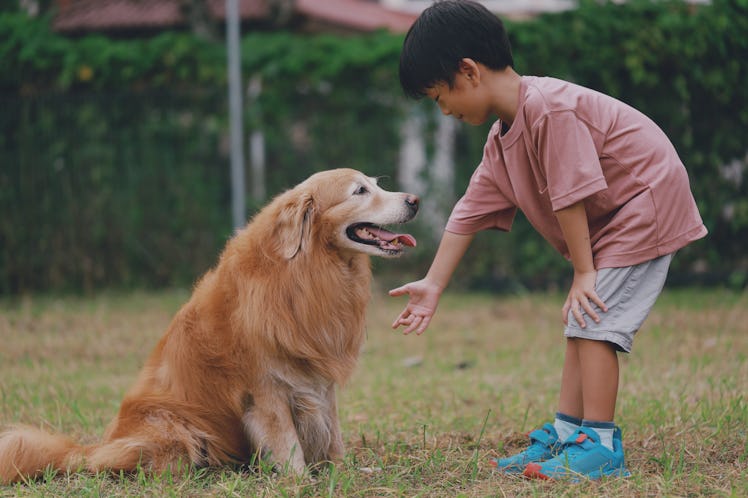What's The Smartest Dog Breed? A New Study Just Figured It Out
A study of 13 popular dog breeds claims to have found the smartest — and least smart — lovable furry friend.

When you decide to add a dog to the family, there are a ton of considerations to address before you choose the perfect pup — especially if you go for a purebred dog or visit a breed-specific rescue, but even if you hit the shelter for a mixed breed in need of a loving home. Does your family lead an active lifestyle, or are you more interested in spending time as a family at home? Do you have young kids? Do you have a yard, or are you a city-dwelling apartment denizen?
All dogs are different, but some characteristics are more common within a breed than others, and it's important that you know what to expect if you opt for a purebred dog. Some breeds love nothing more than laying on the sofa, soaking in your love and adoration (and treats), while others would like nothing more than to run laps around a big backyard.
Thankfully, science can help. A new study just ranked 13 breeds based on intelligence, and the results may help you choose your next four-legged friend.
Over a period of five years, a team of researchers from the University of Helsinki in Finland put more than 1,000 dogs from 13 different breeds through a series of tests designed to measure various characteristics and abilities, such as activity level, exploratory behavior, inhibitory control, logical reasoning, and short-term memory.
It’s important to note that almost all the dogs used for the study were owned, and owners volunteered to bring their pets in for the testing, which consisted of problem-solving with food rewards. Many of the dogs had been through previous training courses, and a small portion were police dogs. That being said...
Who Is the Goodest Boy?
Of the 13 most commonly represented breeds in the testing, surprising no one, Border Collies performed better at most of the tasks than other breeds. In other words, Border Collies have their wits about them and are considered smarter than the rest.
And similarly unsurprising, Labrador Retrievers…did not. Labrador Retrievers are the most popular breed in the U.S. for a reason, though. Although they’re not necessarily known for their smarts, labs are loyal and friendly and make great family pets.
Other breeds* that were tested include:
- English Cocker Spaniel
- Border Collie
- Australian Shepard
- German Shepard
- Belgian Malinois
- Labrador Retriever
- Australian Kelpie
- Finnish Lapphund
- Golden Retriever
- Spanish Water Dog
- Hovawart
- Shetland Sheepdog
- Mixed Breed
*Note that this is a Finnish study, so some of the breeds represented may not be common in the U.S.
Are Smart Dogs Better Than Not-So-Smart Dogs?
If you’re looking down at your Lab right now, shaking your head, give him some scratches and maybe some treats instead. Intelligent breeds can be difficult breeds, especially for busy families juggling work, activities, sleep schedules, and more.
Herding dogs, like Border Collies and Australian Shepards, can be high-strung and need significantly more mental stimulation and activity than more low-key dogs like Labs and Goldens. A bored herding dog can be a destructive herding dog. Plus, if you have kids, bored herding dogs might do what comes naturally and herd the little ones, which can startle kids and mean potentially painful nips to the feet and ankles.
Labs and their less tightly wound brethren still need stimulation and playtime, but they’re less likely to develop problem behaviors, and they get bored way less easily. They’re easily trainable, so commands like ‘sit,’ ‘stay,’ and ‘get off the sofa’ are a piece of cake, and because they’re Retrievers, they play fetch like a boss.
There’s no such thing as a best breed of dog or a worst breed of dog. Dogs are great — all of them. And if you meet their needs, they can all be excellent pets. It’s just that some of them have more specific or demanding needs than others. Consult with your vet or work with a trainer to make sure your dog’s needs are met, and it won't matter if you have a doggy Einstein or goofball with a head full of rocks.
This article was originally published on